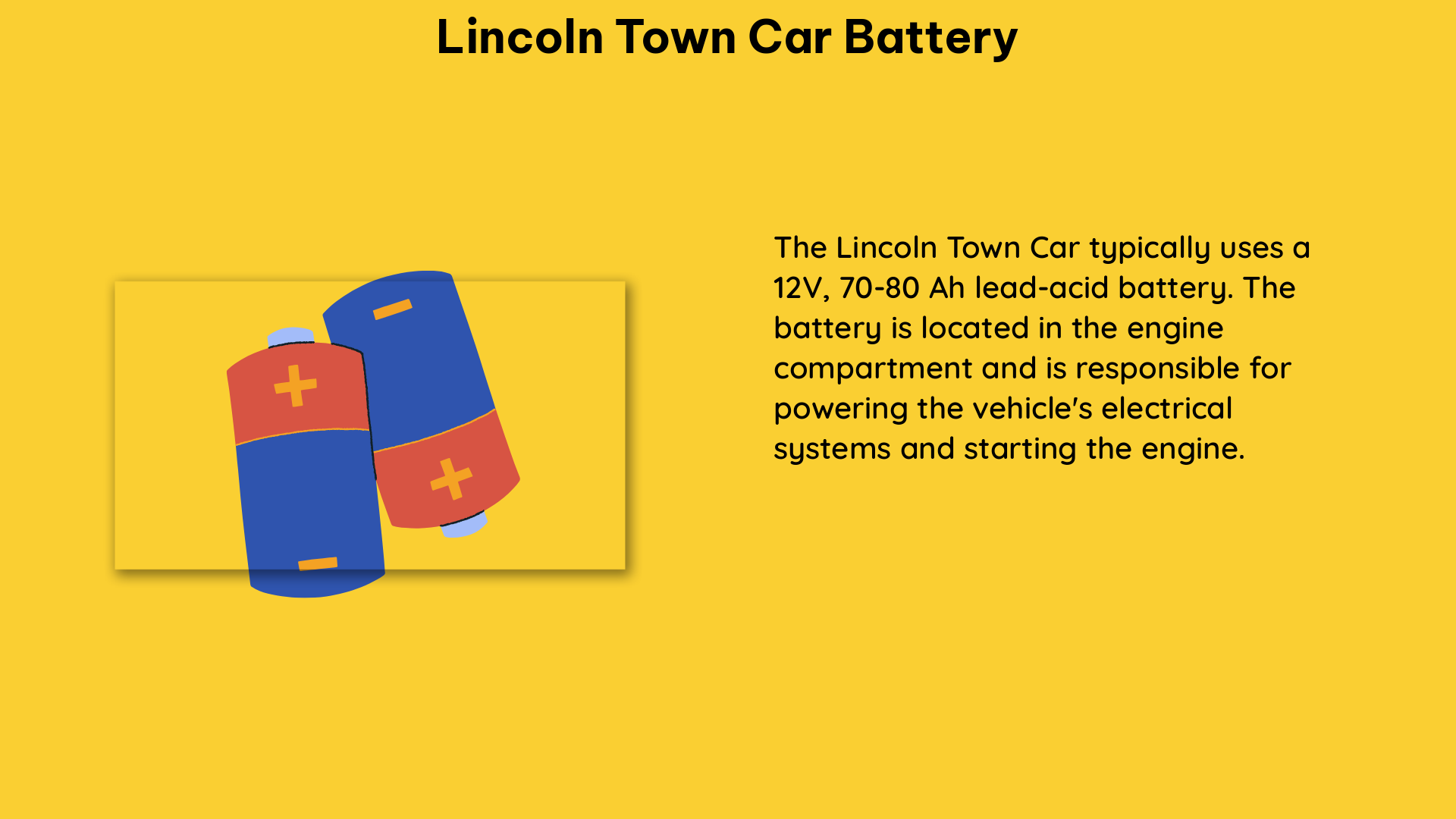The Lincoln Town Car is a full-size luxury sedan that was produced by Ford Motor Company from 1981 to 2011. The Lincoln Town Car battery is a critical component that ensures the smooth operation of this iconic vehicle. To maintain optimal performance and longevity, it is essential to understand the specific technical requirements and common issues associated with the Lincoln Town Car battery.
Battery Specifications for Lincoln Town Car
The Lincoln Town Car typically requires a battery with the following specifications:
- Battery Group Size: 75
- Cold Cranking Amps (CCA): 660-850 amps
- Battery Voltage: 12.6 volts when the car is off, and should not drop below 10.5 volts during operation
These specifications are crucial to ensure that the battery can provide the necessary power to start the engine, run the electrical systems, and support the various accessories in the Lincoln Town Car.
Diagnosing and Addressing Parasitic Drain

One of the most common issues with the Lincoln Town Car battery is parasitic drain, which can cause the battery to discharge even when the car is turned off. This can be caused by various factors, including:
- Faulty Switches: Malfunctioning switches, such as door switches or trunk switches, can continue to draw power from the battery, leading to a parasitic drain.
- Bad Alternator: A faulty alternator can fail to properly charge the battery, causing it to drain over time.
- Leaky Air Springs: Leaky air springs in the Lincoln Town Car can cause the air compressor to run continuously, draining the battery.
To diagnose a parasitic drain issue, you can use a multimeter with amp measuring capabilities to measure the current draw at the battery terminals with everything turned off. If the current draw is more than 0.080 amps, it indicates a problem.
Fixing Parasitic Drain
To fix a parasitic drain issue, follow these steps:
- Unbolt the battery terminal and carefully place the test lead between the terminal and the battery post without breaking continuity.
- If the current draw is more than 0.080 amps, start pulling fuses in the engine compartment fuse box one by one to identify the component that is drawing power.
- Be patient, as some components may take up to 20 minutes to stop drawing power after the fuse is pulled.
- Test each fuse individually until you identify the culprit.
In some cases, a bad rectifier inside the alternator may be the cause of the parasitic drain. A bad rectifier can allow a constant drain through the alternator to ground, leading to an overnight battery drain. To diagnose this issue, you can have your charging system checked at a parts store, which usually offers free services. If the rectifier is bad, you may need to replace the alternator or install a wrecking yard special, which can cost around $50.
Maintaining the Lincoln Town Car Battery
To ensure the longevity and optimal performance of the Lincoln Town Car battery, it is essential to follow these maintenance tips:
- Regular Cleaning: Keep the battery terminals and connections clean and free of corrosion to maintain a good electrical connection.
- Voltage Monitoring: Regularly check the battery voltage to ensure it is within the recommended range of 12.6 volts when the car is off and does not drop below 10.5 volts during operation.
- Replacement Interval: Replace the battery every 3-5 years, or as recommended by the manufacturer, to prevent premature failure.
- Proper Storage: If the Lincoln Town Car is going to be stored for an extended period, disconnect the battery to prevent discharge.
By following these guidelines and addressing any issues promptly, you can ensure that the Lincoln Town Car battery continues to provide reliable power and support the vehicle’s electrical systems.
Conclusion
The Lincoln Town Car battery is a critical component that requires specific technical specifications and proper maintenance to ensure optimal performance and longevity. Understanding the battery’s requirements, diagnosing and addressing parasitic drain issues, and following recommended maintenance practices are essential for maintaining the health and reliability of the Lincoln Town Car’s electrical system.
References:
- Lincoln Town Car Battery Drain Issue
- Lincoln Town Car Battery Replacement
- Troubleshooting Lincoln Town Car Battery Drain
- Lincoln Town Car Parasitic Drain Diagnosis
- Diagnosing Lincoln Town Car Parasitic Draw
- Lincoln Town Car Battery Troubleshooting

The lambdageeks.com Core SME Team is a group of experienced subject matter experts from diverse scientific and technical fields including Physics, Chemistry, Technology,Electronics & Electrical Engineering, Automotive, Mechanical Engineering. Our team collaborates to create high-quality, well-researched articles on a wide range of science and technology topics for the lambdageeks.com website.
All Our Senior SME are having more than 7 Years of experience in the respective fields . They are either Working Industry Professionals or assocaited With different Universities. Refer Our Authors Page to get to know About our Core SMEs.